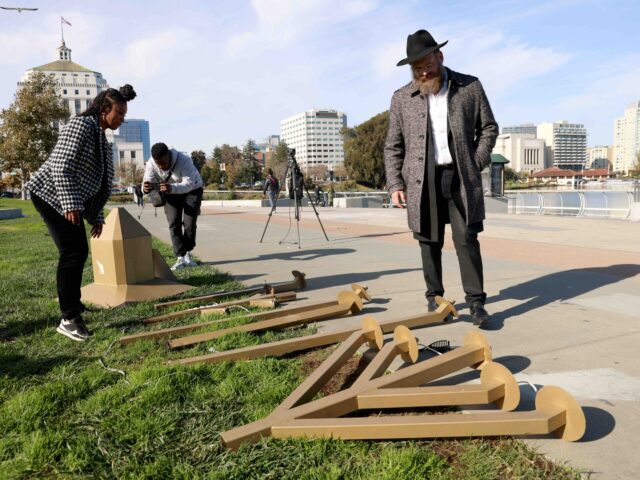Harvard Chabad Rabbi Hirschy Zarchi delivered a speech in Harvard Yard on Wednesday before lighting the seventh candle of Hanukkah — with Harvard President Claudine Gay in attendance — in which he decried the indifference of the institution to antisemitism.
While cordial to Gay, who had just been reconfirmed in her post, Zarchi noted that Harvard would not allow the menorah to stand overnight, for fear of vandalism — and that not one of his 50 fellow Harvard chaplains had spoken out. Not one.
The rabbi observed that he had long wondered, growing up in the decades after the Holocaust, how people could have failed to speak out. Now he knew.
When he, and other Jews on Harvard’s campus, noted that chants like “globalize the intifada” were a call for violence against Jews, they were told that they were misrepresenting the term “intifada” — that it merely meant “resistance.” After all, wasn’t the first intifada, in 1987, “mostly peaceful,” aside from the rock-throwing and rioting against Israeli soldiers?
Perhaps, but the second intifada, from 2000-2005, was a brutal campaign of suicide bombing that targeted civilians, killing over 1,000. It was encouraged by the Palestinian Authority government, which subsidizes terrorists and their families to this day.
So when you chant “globalize the intifada,” you are calling for worldwide terror. At best, you are saying Jewish lives don’t matter.
That does not help the Palestinian cause — it does not build a single home or plant a single tree — but it justifies antisemitism.
Some see the issue as morally complicated, because they see the Palestinian cause as a legitimate one, and do not want to criticize it.
That was the case made by some of Gay’s supporters, who worried that the effort to stop antisemitism would suppress free speech on behalf of Palestinians. Perhaps Harvard’s chaplains might have spoken out if the anti-Israel protesters had yelled something explicit, like “Gas the Jews,” which was shouted in Sydney, Australia.
But they were silent — and comfortably so.
That is how antisemitism has always worked: it has cloaked itself in the form of a legitimate grievance, even in the Holocaust.
The mass murders of the Holocaust did not begin at Auschwitz. They began in the Baltics, where the invading Nazis were able to convince local nationalist militias and police to do most of the killing. Part of the reason they did so had to do with deep-seated religious prejudices. But for many, the immediate motivation for violence was retaliation for the recent, brutal, Soviet occupation.
The Soviets rounded up tens of thousands of Lithuanians, including Jewish intellectuals (like my grandfather’s cousin, the writer Yechezkel Pulerevich), and sent them to the gulag.
The Nazis exploited local trauma by telling Lithuanians that the “Bolsheviks” were Jews, a grotesque lie that relied on the fact that some communists were, in fact, Jewish.
(Ironically, as historian Timothy Snyder points out, former Soviet commissars were often the most enthusiastic murderers of Jews in Nazi-occupied Europe.)
Few spoke out, because retaliation against Soviet occupation was a legitimate cause, even if it was exploited for mass murder.
Hamas counts on precisely such sympathy when it carries out mass murders of Jews in the present day. In fact, many of those protesting for the Palestinians today deny that Hamas committed atrocities on October 7. They point to a few inaccurate early stories, and claim that the whole thing was made up. They tear down the posters of Jewish hostages; they rarely condemn Hamas.
So now we know how the Holocaust happened. We have relived a part of it — witnessing the pogrom of October 7, and the silence of elite institutions that could not find the moral courage to choose right over wrong.
Calls for the murder of Jews should not be permitted on campus; they are not protected by the First Amendment. Groups who chant “intifada” and say it means something else should be allowed to argue that, but should not receive university subsidies.
And, for God’s sake, chaplains need to speak out.
I want to close on an optimistic note, if possible. This week, as in every year on Hanukkah, Jewish congregations will read the story of Joseph from Genesis.
Joseph’s life parallels the Jewish fate. He is “chosen” by his father, and given a unique mission; that evokes the envy and hatred of his brothers, who sell him into slavery. Joseph excels despite his persecution — and is punished, again and again, though he is innocent. Ultimately, he is saved after he interprets the dreams of Pharaoh’s courtiers in prison.
Jewish tradition teaches that Joseph spent an additional two years in prison because he trusted Pharaoh’s butler to remember him, rather than trusting in God; he deserved that part of his punishment.
I see it differently: Joseph spent more time locked up because he disparaged the prison as a “pit” (40:15), like the one into which his brothers had thrown him. He did not see the potential for light in the darkness.
We’re having a hard time seeing the potential for good in the world right now. But we have to try.
Joel B. Pollak is Senior Editor-at-Large at Breitbart News and the host of Breitbart News Sunday on Sirius XM Patriot on Sunday evenings from 7 p.m. to 10 p.m. ET (4 p.m. to 7 p.m. PT). He is the author of the new biography, Rhoda: ‘Comrade Kadalie, You Are Out of Order’. He is also the author of the recent e-book, Neither Free nor Fair: The 2020 U.S. Presidential Election. He is a winner of the 2018 Robert Novak Journalism Alumni Fellowship. Follow him on Twitter at @joelpollak.

COMMENTS
Please let us know if you're having issues with commenting.